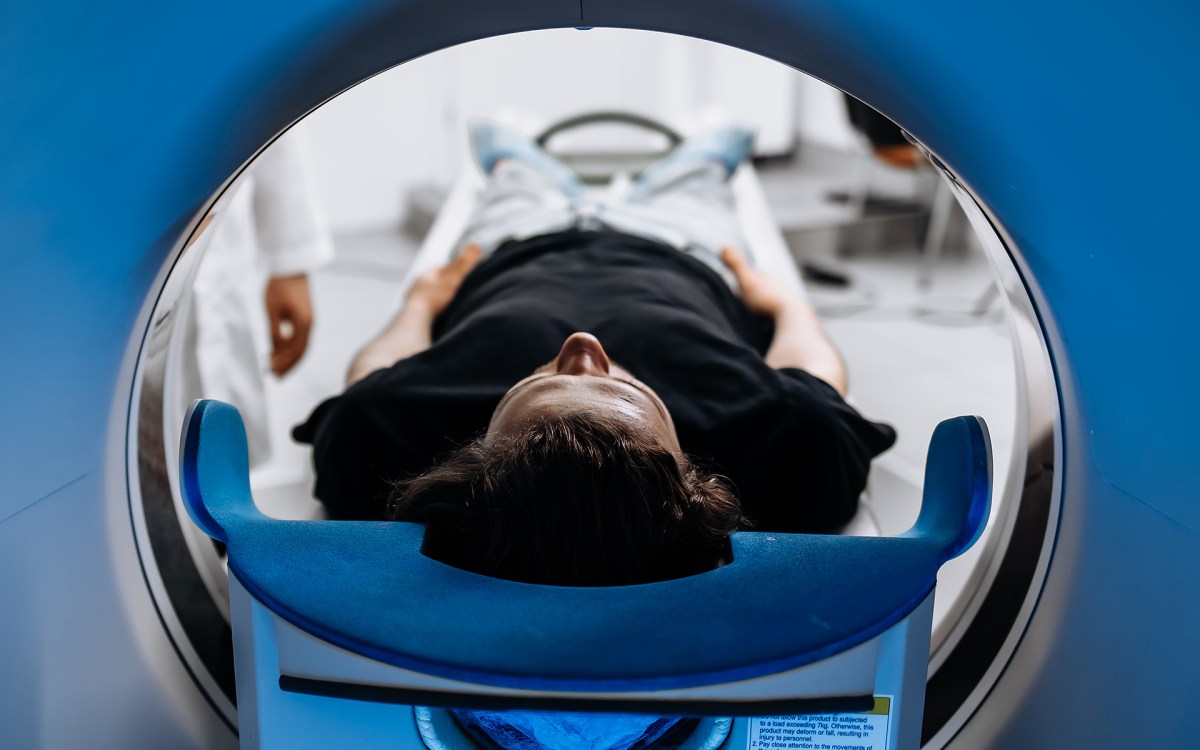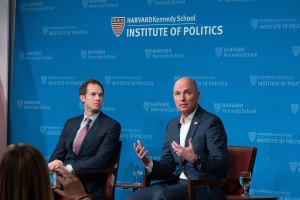Tag: Research
-
Health
Gene variants probably increase risk for anxiety disorders
Massachusetts General Hospital (MGH) researchers — in collaboration with scientists at the University of California, San Diego, and Yale University — have discovered perhaps the strongest evidence yet linking variation in a particular gene with anxiety-related traits. In the March issue of Archives of General Psychiatry, the team describes finding that particular versions of a…
-
Health
Biologist Venter will be visiting scholar at Origins of Life Initiative
J. Craig Venter, the visionary biologist and intellectual entrepreneur who was a leading figure in the decoding of the human genome, will join Harvard University as a visiting scholar at the University’s Origins of Life Initiative.
-
Nation & World
Consumers want to do the right thing
A majority of consumers want to do the right thing. That is, in numerous studies, consumers say that they are willing to pay more for products produced under good working conditions, rather than those that come from sweatshops. But what consumers say and what they actually do when they pull out their wallets at the…
-
Campus & Community
Undergrad grants available through Schlesinger Library
The Arthur and Elizabeth Schlesinger Library on the History of Women in America invites Harvard undergraduates to make use of the library’s collections with competitive awards of amounts up to $2,500 for relevant research projects.
-
Health
HMS, Broad Institute team works to better understand mitochondria
Why do nearly 1 million people taking cholesterol-lowering statins often experience muscle cramps? Why is it that in the rare case when a diabetic takes medication for intestinal worms, his glucose levels improve? Is there any scientific basis for the purported health effects of green tea?
-
Health
Research in brief
GROWING U.S. DISPARITIES IN HEALTH NOT INEVITABLE NEW WAY TO GROW BLOOD VESSELS
-
Health
History of Women in Medicine fellowship material due March 1
The Foundation for the History of Women in Medicine (FHWIM) is offering two fellowships to support research conducted at the Center for the History of Medicine and its Archives for Women in Medicine, located at Harvard Medical School’s Countway Library.
-
Campus & Community
Pilot program offers grants to defray child care costs
The Research Enabling Grants program (REG) — a pilot program administered through the Office of Faculty Development and Diversity — offers tenure-track faculty and benefits-eligible postdoctoral fellows financial support to enable research that would otherwise suffer due to significant child care or adult dependent care obligations.
-
Arts & Culture
Fieldwork, community service key in study abroad
Long lines at the airport customs desk? Blame those Harvard undergraduates — in the 2006-07 academic year alone, 1,458 students had an international experience of some kind. While summer travel has historically been the most popular option, increasing numbers of undergraduates are choosing to spend a full semester abroad.
-
Campus & Community
HSPH offers scholarship opportunity
The Harvard School of Public Health (HSPH) recently announced a new scholarship opportunity for students and scholars from Southeast and East-Central Europe.
-
Health
‘Attentional collapse’ causes an inability to imagine future satisfaction
Researchers have identified a key reason why people make mistakes when they try to predict what they will like. When predicting how much they will enjoy a future experience, people tend to compare it to its alternatives — that is, to the experiences they had before, might have later, or could be having in the…
-
Health
From adult to embryonic stem cell
Harvard Stem Cell Institute (HSCI) and Massachusetts General Hospital (MGH) researchers have taken a major step toward eventually being able to reprogram adult cells to an embryonic stem cell-like state without the use of viruses or cancer-causing genes.
-
Health
Homing in on features of ‘humaniqueness’
Shedding new light on the cognitive rift between humans and animals, a Harvard University scientist has synthesized four key differences in human and animal cognition into a hypothesis on what exactly differentiates human and animal thought.
-
Campus & Community
Center for European Studies welcomes its new 2008 spring fellows
The Minda de Gunzburg Center for European Studies (CES) has announced the arrival of its 2008 spring fellows.
-
Campus & Community
Local superintendents, Faust share ideas
Harvard President Drew Faust met with public school superintendents and professional associates from Boston area schools on Feb. 8 to share ideas about, among other things, educational leadership, teaching and learning, and preparing students from preschool through college and beyond.
-
Health
Newly identified gene variants associated with prostate cancer risk
Three studies presenting newly identified genetic variants that are associated with increased susceptibility to prostate cancer were published recently (Feb. 10) on the advance online site of Nature Genetics. The 10 gene variants double the number of known variants associated with risk of the disease and are the result of genomewide association studies.
-
Health
Anxiety linked to overestimation of breast cancer risks
Elevated levels of anxiety may cause women with ductal carcinoma in situ (DCIS), the most common form of noninvasive breast cancer, to overestimate their risk of recurrence or dying from breast cancer, suggests a study led by researchers at Harvard-affiliated Dana-Farber Cancer Institute in Boston.
-
Health
Infants are able to recognize quantity
By looking at infant brain activity, researchers have found that babies as young as 3 months old are sensitive to differences in numerical quantity. Additionally, the scientists were able to see that babies process information about objects and numbers in different, dissociated parts of the brain, which is also the case in older children and…
-
Health
BWH-led tuberculosis research project receives $14M NIH grant
Researchers at Brigham and Women’s Hospital (BWH), the Harvard School of Public Health (HSPH), Harvard Medical School (HMS) and Partners In Health (PIH) have received a grant of $14 million over five years from the National Institutes of Health to study multi-drug-resistant tuberculosis (MDR-TB) and extensively drug-resistant tuberculosis (XDR-TB). The goal of the project is…
-
Health
How brain cells make good connections
Harvard neuroscientist Venkatesh N. Murthy has a sunny second-floor office on Divinity Avenue, where he is a professor in Harvard’s Department of Molecular and Cellular Biology. In one corner is a set of weights and a soccer ball — both untouched in over a year, he said, because of an intensely busy schedule.
-
Campus & Community
Harvard to collect, disseminate scholarly articles for faculty
In a move to disseminate faculty research and scholarship more broadly, the Faculty of Arts and Sciences (FAS) voted Tuesday (Feb. 12) to give the University a worldwide license to make each faculty member’s scholarly articles available and to exercise the copyright in the articles, provided that the articles are not sold for a profit.
-
Campus & Community
In brief
Bok Center offering half time postdoc fellowship, HSPH symposium to tackle thorny international health issues, Grants, fellowships available to HMS members, HSPH announces new scholarship opportunity, Docent-led tour at Semitic Museum upcoming, HMS center honors trio for global environmental efforts, Center for Wellness and Health announces spring bounty
-
Campus & Community
Korea Institute receives grant for development of programs
The Northeast Asian History Foundation (NEAHF) in Seoul, Korea, has awarded a grant of $1 million over a five-year period to the Early Korea Project at the Korea Institute, Harvard University.
-
Campus & Community
Lester Kissel Grants available to undergrads
Harvard College students are eligible to apply for a Lester Kissel Grant in Practical Ethics to support research and writing that makes contributions to the understanding of practical ethics. A number of grants, each up to $3,000, will be awarded on a competitive basis for projects to be conducted during the summer of 2008. The…
-
Campus & Community
IOP announces spring resident fellowships
Harvard University’s Institute of Politics (IOP), located at Harvard’s Kennedy School of Government, has announced the selection of an experienced group of individuals for resident fellowships this spring. Resident fellows interact with students, participate in the intellectual life of the community, and pursue individual studies or projects throughout an academic semester.
-
Campus & Community
Shorenstein Center names visiting faculty, fellows for spring
The Joan Shorenstein Center on the Press, Politics and Public Policy, located at Harvard’s John F. Kennedy School of Government, recently announced its spring fellows.
-
Health
Cancer stem cells can be targeted for destruction
It’s increasingly believed among scientists that nearly every cancer contains small populations of highly dangerous cells — cancer stem cells — that can initiate a cancer, drive its progression, and create endless copies of themselves. On the theory that targeting these cells might be an effective therapeutic strategy, researchers around the world have begun isolating…
-
Health
Research in brief
Major differences in protocols used to determine brain death; Harvard researchers achieve stem cell milestone; Consortium links chromosome abnormality to autism disorders; Blocking HIV infection; Oral osteoporosis meds appear to reduce the risk of jaw degradation; Six new genetic variants linked to heart-disease risk factor; Gene variation may elevate risk of liver tumor in some…
-
Campus & Community
Chemistry Department creates Fieser Fellowship
Harvard University’s Department of Chemistry and Chemical Biology (CCB) has announced the creation of the Mary Fieser Postdoctoral Fellowships Program to promote the recruitment, development, and mentorship of women and underrepresented groups in areas across the chemical sciences.
-
Campus & Community
Damon Runyon Cancer Research Foundation awards fellowships
The Damon Runyon Cancer Research Foundation has named three Harvard affiliates among its 17 new fellows. The recipients of this prestigious, three-year award are outstanding postdoctoral scientists conducting basic and translational cancer research in the laboratories of leading senior investigators across the country.


